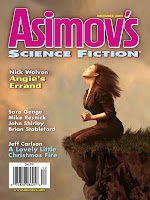2. Sara Genge, "As Women Fight" (pg. 24-33) **
Read 13 Dec. 2009. This story has an inventive idea, and metaphor, at its centre: a somewhat evolved human culture, apparently owing to the influence of long-ago visitors from outer space, is built around the potentially annual exchange of bodies between husbands and wives -- rather, exchange of personalities, or selves -- depending on who wins a "Fight" (actual, ritualized physical combat). Yet the story is too heavy-handed with its biases regarding the implications of this idea/metaphor. People switch bodies in order to inhabit, experience, and understand the minds and desires and proscribed roles of both genders; the women, however, are made to be the more desirable choice (faster, heightened senses, etc.) overall, while the men fit into clichéd behaviours and types, despite the story's admirable attempts to blur and challenge gender constructions/constrictions. The main character, Merthe, is an effective focalizer: ambiguous; confused; at a point of personal and cultural conflict, and so willing to do things differently and accept the consequences; chivalrous, heroic. I wonder, though, if switching bodies and a transferrable consciousness/self/personality aren't becoming overly conventional in SF now? Also, Genge seems to be reaching for the substance of Russ or Tiptree, Jr., but the . . . artistry feels not quite up to the task.
3. John Shirley, "Animus Rights" (pg. 34-43) ** 1/2
Read 14 Dec. 2009. I like the premise: two aliens named Adversary and Animus, whose true form is a "lightbody," have been fighting and defeating each other on Earth for centuries, inhabiting a succession of human bodies and participating in major military conflicts such as the French Revolution or World War I. Able to live up to 500,000 years, they see humans as "primates," of interest for the brutal intensity of their wars. Yet they are taking too direct a role in pushing humanity toward its destruction, and so are told to back off by their homeworld's Committee. I like the premise, for it gives Shirley ample opportunity to comment on our penchant for violence in the past, today, and in the future; it creates room for Shirley to suggest a slightly new twist on the "art" of war. However, there is a predictability in the story, and the writing is frequently awkward, especially when the perspective and dialogue are that strictly of the "emerged" Adversary and Animus (e.g., "'Seven years of peaceful marriage, and suddenly you're a man of blood,' Wilamina said suddenly ..." [34]; "Then Adversary looked up at Animus -- at the lightbody that had departed the shattered primate body. ..." [36]). The parts don't quite make for a wholly unified, skillfull whole.
4. Nick Wolven, "Angie's Errand"
5. Jim Aikin, "Leaving the Station"
6. Benjamin Crowell, "A Large Bucket, and Accidental Godlike Mastery of Spacetime"
7. Mike Resnick, "The Bride of Frankenstein"
8. Brian Stableford, "Some Like it Hot"


No comments:
Post a Comment